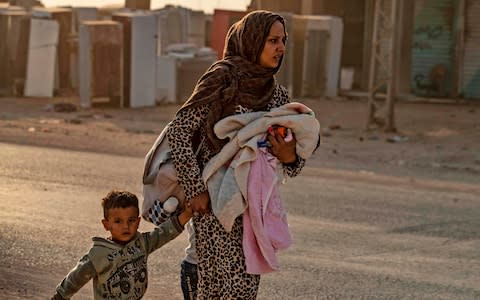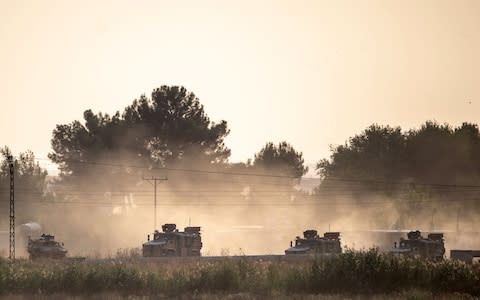Kurds abandon fight against Isil as Turkey attacks with air power and artillery deep into Syria

The West’s Syrian Kurdish allies announced on Wednesday that they were halting all operations against Isil as they rushed their forces to face the long-awaited Turkish assault on northeast Syria.
Turkey unleashed a wave of airstrikes and artillery bombardment against the Syrian Democratic Forces (SDF) along the Turkish border but also struck deeper inside Syria, possibly indicating a wider offensive than initially expected.
At least two civilians were killed in the first hours of the attack, the SDF said, and the roads along the border were clogged with cars and trucks as thousands of terrified people fled for safety.
Recep Tayyip Erdoğan, the Turkish president, said the offensive would be known as Operation Peace Spring and was designed to push back the SDF, which Turkey considers a terrorist group.
“Our mission is to prevent the creation of a terror corridor across our southern border, and to bring peace to the area,” he said.

Last night, Dominic Raab said he had “serious concerns about the unilateral military action that Turkey has taken. This risks destabilising the region, exacerbating humanitarian suffering, and undermining the progress made against Daesh which should be our collective focus."
The foreign secretary said the UK would resist plans for Syrian refugees to be returned to the so-called safe zone.
European states immediately condemned the Turkish incursion and called for an emergency meeting of the UN Security Council on Thursday. The EU called for an immediate stop to the attack, warning it would "undermine the stability of the whole region".
Donald Trump, who has given contradictory messages in recent days, said the attack was “a bad idea” but did not call for a halt. He said Turkey had promised to protect civilians and avoid a humanitarian disaster “and we will hold them to this commitment”.
The Turkish attack appeared to immediately embolden Isil loyalists, confirming the fears of Western security officials that the jihadists would try to take advantage of the chaos caused by the fighting.

There were reports of rioting by female Isil prisoners against their guards at al-Hol, the vast detention camp where 70,000 women and children are being held. An Isil suicide bomber also attacked an SDF position in Raqqa hours before the offensive began.
The SDF said it was halting its anti-Isil operations because all its forces were needed to face the Turks. “It's impossible to carry out any operation while you are being threatened by a large army right on the northern border," an official said.
Many of the SDF troops in the area around al-Hol have been ordered north, a local source said, which may encourage detainees to attempt a prison break even though armed guards remain in the camp.
The Turkish strikes began on the border towns of Ras al-Ain and Tal Abyad but quickly expanded to include SDF targets far outside of Mr Erdoğan’s proposed 20km “safe zone” along the Turkish border.

Warplanes reportedly struck on the towns of Derik and Qamishli as well as an SDF base at Ain Issa, close to where a camp holding foreign Isil wives and children, including some British citizens.
“There's smoke, columns of smoke rising above the city,” said Lizzie Irvine, a British volunteer with the Kurds, told The Telegraph from Ras al-Ain. “There's a lot of chaos and confusion, people are scared.”
The SDF fired mortars and rockets into two towns in southern Turkey in response, according to Turkish media. No casualties were reported.
Turkish warplanes have started to carry out airstrikes on civilian areas. There is a huge panic among people of the region.
— Mustafa Bali (@mustefabali) October 9, 2019
Turkey is likely to continue its aerial bombardment before sending in fighters from the Syrian National Army, a Syrian rebel proxy group, supported by Turkish armoured units and special forces.
While the SDF proved adept at combatting Isil, they lack heavy weaponry and anti-aircraft equipment and are likely to struggle in a confrontation with Turkey’s modern military.
There was deep confusion over what would happen to Isil fighters being held in a string of Kurdish prisons across northeast Syria.
The White House said Turkey would now be responsible for "all Isil fighters being held captive”. But Turkey appeared to contradict that on Wednesday, saying it would demand that Britain and other European countries take their citizens home.
"They should take them, try them and follow the due judicial process,” said Ibrahim Kalin, a spokesman for Mr Erdoğan.
Lindsey Graham, a Republican senator close to Mr Trump, said the White House had "shamelessly abandoned" the SDF to the Turkish attack. "I urge the president to change course while there is still time," he said.
US officials told the Washington Post they had no plans to intervene and seize control of the string of Kurdish prisons where thousands of Isil fighters, including British jihadists, are being held.
The SDF have warned they may have no choice but to abandon the prisons and send all available forces north to confront Turkish troops on the border.
In the face of a backlash from congressional Republicans, Mr Trump has begun sending deeply mixed messages about the American position on Turkey’s offensive.
It is really a shame that the whole world calmly watching annihilation of a people who sacrificed their lives in order to achieve a secure and peaceful world free from terrorism. Indeed, nothing is harder than leaving your companion alone in the trench in battle.
— Shervan Derwish (@shervanderwish) October 8, 2019
After initially appearing to wash his hands of the Kurds, he said Tuesday that “in no way have we abandoned the Kurds” and threatened economic sanctions on Turkey if there was “any unforced or unnecessary fighting”.
Mr Erdoğan is expected to meet Mr Trump at the White House on November 13.
In an article published in the Washington Post, Fahrettin Altun, an aide to Mr Erdogan, framed Turkey’s intervention in northeast Syria in terms designed to appeal to Mr Trump, who has often complained of America’s involvement in “endless wars” abroad.
“America has borne the brunt of the counter-Islamic State campaign for too long,” Mr Altun said, adding that US troops in Syria “deserve to return home”.
He urged Kurdish fighters to lay down their guns and refuse to listen to their commanders' orders to resist Turkey’s advance. If they refuse to join Turkey “we will have no choice but to stop them from disrupting our counter-Islamic State efforts,” he said.
He also framed Turkey’s plans for a “safe zone” in northern Syria as a win-win for the international community, saying that it would give Syrian refugees in Turkey and Europe a safe place to return to.
The Turkish Armed Forces, together with the Syrian National Army, just launched #OperationPeaceSpring against PKK/YPG and Daesh terrorists in northern Syria. Our mission is to prevent the creation of a terror corridor across our southern border, and to bring peace to the area.
— Recep Tayyip Erdoğan (@RTErdogan) October 9, 2019
However, human rights groups have warned the Turkish place potentially involves vast displacement of local populations in north east Syria to make room for more than 1 million refugees and questioned whether Turkey has a real plan to support such a large population.
Kurdish groups pointed to the fate of Afrin, a city in northwest Syria that was overrun by Turkish and Syrian rebel forces in 2018. Syrian rebel troops were accused of killing civilians and looting once they took control.

 Yahoo News
Yahoo News 
